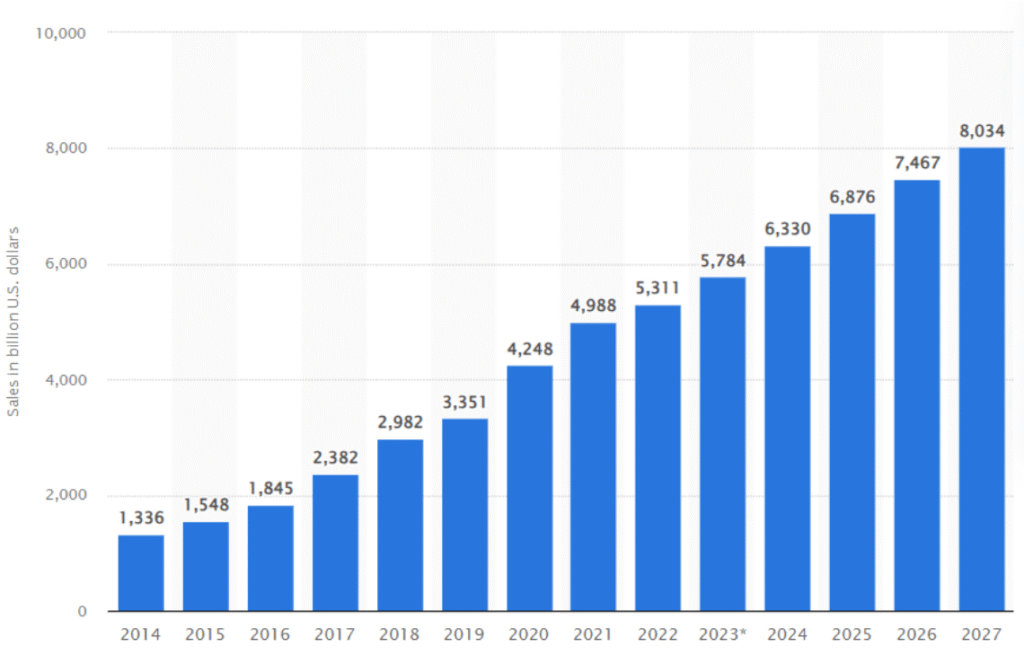Want to know why your competitors thrive while your business struggles? The answer lies in one simple thing: your website.
A website works as your business’s online storefront. It’s where customers discover your products or services, learn about your brand, and take action.
Without a website, you are missing out on a massive opportunity to reach potential customers. The reality is, 30% of customers don’t even consider a business without a website.
Website builds credibility, showcases your offerings, and drives sales. It’s cost-effective, open 24/7, and helps you stay competitive.
Stay tuned as we discuss the importance of websites for businesses of all sizes, from local ventures to larger enterprises.
The Digital Revolution: How Online Changed Everything
Remember when shopping meant heading to the mall? Those days are fading fast! The internet has turned the business world upside down! Online shopping is booming in 2024.
Around 5.45 billion people actively use the internet and 90% of them access via mobile devices. If you really care, and take your business seriously, it’s impossible to miss out on a website.

People are turning to the internet for everything – from searching products to making purchases. Think about it: How often do you Google before buying? It’s the same for everyone else.
COVID-19 gave online shopping a massive boost. More and more people got comfortable buying things online, and businesses without a strong online presence struggled to keep up.
So, if you want to stay relevant and grow your business, having a website is no longer just an option – it’s a necessity.
What Are The Risks Of Not Having A Website
Picture yourself as a customer. You’re searching for a local business to solve a problem. You Google the keywords and…nothing.
No website, no information. Where do you go next? Probably your competitor. Not having a website can cost you dearly. Here are some common risks with their impact:
| Risk | Description | Impact on Business |
| Missed Growth & Revenue | Without a website, potential customers can’t find you online. | Loss of sales opportunities, limited market reach, and hindered business growth. |
| Loss to Competitors | Competitors with websites can attract your customers by providing online convenience. | Customers turn to competitors who offer online engagement and transactions, leading to lost business. |
| Damaged Credibility | Businesses without websites seem outdated and less reliable. | Reduced trust and confidence from customers; harms your brand reputation. |
| Difficulty Attracting Talent | Job seekers often research companies online before applying. | Tough to recruit skilled employees, as they may perceive the business as less credible. |
| Missed Online Marketing | Lack of websites prevents use of online marketing tools like SEO, PPC, and social media marketing. | Missed opportunities for increasing brand awareness, customer acquisition, and targeted advertising. |
| Limited Customer Interaction | No website means fewer channels for engaging with customers, like live chat, email forms, or FAQs. | Reduced customer satisfaction and loyalty, as customers can’t get the necessary support easily. |
| Inability to Provide Information | Without a website, it’s difficult to share vital information such as business hours, services, or offers. | Customers may become frustrated by the lack of information. It leads to a decline in inquiries or visits. |
Not having a website puts your business at a great disadvantage in this digital world. Consider these risks to unlock new opportunities and stay competitive in the market.
Importance Of A Website For Your Local Business
It doesn’t matter if you’re running a local business or a global one, it’s hard to deny the necessity of a website. Here’s why a website is important for your business:
First Impressions Matter
Your website is your digital storefront. It’s often the first thing potential customers see, and first impressions matter.
The design of a website influences almost 94% first impressions. A well-designed website instantly shows professionalism, credibility, and trustworthiness.
Businesses without websites tend to appear outdated or less reliable. In today’s world, customers expect to find information online, and having no website can turn them away.
Reach a Broader Audience
A website lets your business connect with customers far beyond your local area. Instead of relying solely on foot traffic, anyone can see your products or services with internet access.
Many businesses see a spike in customers just with a simple site. Studies show 48% of small businesses who moved online during Covid plan to continue since it drives growth and revenue.
Being listed on search engines means your business is more likely to pop up when people are looking for what you offer.
This added visibility can lead to a growing customer base and more opportunities. Without an online presence, you risk losing potential clients to competitors who are more discoverable.
24/7 Accessibility and Customer Convenience
Customers expect convenience. A website makes your business accessible anytime, anywhere. It’s like having a virtual storefront open 24/7, ready to serve customers whenever they need you.
Let’s say a customer looking for your products or services at 10 PM on a Sunday. With a website, they can easily find what they need and even make a purchase.
This round-the-clock accessibility enhances customer service and shows your commitment to meeting their needs.
Here are some examples of how a website can improve customer access:
- Online ordering and purchasing: Customers can buy products or services directly from your website, saving them time and effort.
- FAQ sections: Provide answers to common questions, reducing the need for customers to contact your support team.
- Live chat or contact forms: Allow customers to easily get in touch with your business for inquiries or support.
- Online scheduling: Let customers book appointments or consultations at their convenience.
A website ensures your business is always open for business. It provides exceptional customer service and builds trust with your audience.
Cost-Effective Marketing
Amongst all the business marketing tools, a website is one of the most budget-friendly options. Traditional advertising often costs thousands of dollars.
But, websites let you reach your audience without breaking the bank. Through strategies like SEO, you can attract organic traffic.
It means people will find your business through search engines. Content marketing lets you engage visitors with helpful articles, videos, or blogs,
This keeps them interested and encourages them to return. Social media integration allows you to easily share your content and reach more people with little to no cost.
Compared to TV, radio, or print ads, maintaining a website is significantly cheaper while offering long-term benefits.
E-Commerce Opportunities
If you want to boost your business sales, there’s no alternative to a website. Because, a website opens doors to online sales and new revenue streams.
Numbers don’t lie! E-commerce sales have skyrocketed in recent years, and it’s estimated to reach up to $8034 billion in 2027.

Businesses with a website are seeing significant growth by selling products and services online. So, what are you waiting for?
Go for a website, which will be your first step. Consider using an e-commerce platform to set up your online store, integrate payments, and manage orders.
Credibility and Trust Building
Want to build trust and credibility for your business? A website is the key! It gives customers a place to learn about your services and see that you’re the real deal.
Feature testimonials, case studies, and well-crafted content to show your expertise. Highlight certifications, awards, and accomplishments to further boost confidence in your brand.
Make sure your website reflects your business’s professionalism and trustworthiness. A strong online presence can go a long way in building relationships and attracting new customers.
Competing in the Digital Marketplace
Businesses with websites hold a huge edge in the digital marketplace. Studies show that 87% of shoppers begin their product searches online, even when they intend to purchase in-store.
In contrast, companies without a website miss out on these opportunities. Around 28% of small businesses don’t have a website, which puts them at a competitive disadvantage.
Competitors with an online presence often outpace those without one. Here’s a comparative analysis of businesses With vs. Without websites:
| Aspect | Businesses With Websites | Businesses Without Websites |
| Customer Acquisition | 63% higher rate | 42% lower rate |
| Lead Generation | 33% increase in leads | Significantly lower leads |
| Online Sales Growth (Retail) | 14% growth in 2023 | 0% |
| Credibility & Trust (Survey Data) | 89% gain trust | 12% loss of credibility |
| Potential Lost Revenue | Minimal | Estimated at 30% of sales |
The difference is clear: a business without a website is losing potential customers and revenue. So, having a website isn’t just an option anymore—it’s a necessity to keep up with competitors.
Building Customer Relationships
Your website isn’t just a digital brochure; it’s a powerful tool to connect with customers and build lasting relationships.
Through regular updates like blogs and newsletters, you can keep customers informed and engaged. Offer exclusive content or special promotions to strengthen that connection.
FAQ sections and interactive tools, like live chat, make it easy for customers to find answers quickly, enhancing their experience.
Additionally, you can use analytics and feedback tools to understand customer behavior. You can see what pages they visit, how long they stay, and what content resonates with them.
All these insights allow you to refine your approach. Thus, you’ll be able to offer even more relevant content and services that align with their preferences.
Adaptability To Market Changes
We live in the digital age, where things can change in the blink of an eye. That’s where your website shines! It’s the most adaptable marketing tool you have.
Remember the pandemic? Many companies had to pivot quickly to stay afloat. With a website you can easily optimize offerings, shift to e-commerce, adjust services to meet customer needs.
Future-proof your business with a website that’s responsive and scalable. This means it looks great on all types of devices and can handle growth without breaking a sweat.
Having a website ensures you’re never left behind. So, adapt, evolve, and conquer the ever-changing business landscape!
Brand Building and Control
One of the most powerful tools to control your brand’s narrative is a website. It lets businesses shape customer perception and offer a unique brand experience.
You can manage every detail from design to messaging to craft a consistent and engaging brand identity of your business.
Take Airbnb as an example. They grew their brand by using their website to showcase unique stays, customer stories, and curated content.
Their website reinforced their message of belonging anywhere, creating a distinct, memorable identity. With strategic website content, you can easily build trust, loyalty, and long-term growth.
Improved Customer Insights
A website is like a window into your customers’ minds. It collects valuable data on what they like, how they browse, and what makes them buy. Here’s how:
Behavior Tracking:
Use web analytics tools like Google Analytics, to see which pages they spend the most time on, what products they view, and where they drop off during the purchase process.
Customer Preferences:
Data on user behavior shows what your audience prefers. Track the most viewed products to get inventory decisions. Monitor content engagement to shape your marketing messages.
Refining Marketing Strategies:
With insights into customer demographics, geographic locations, and interests, you can target ads more effectively. It also helps to personalize content for better engagement.
Every click, visit, and action taken on your website tells a story about what your customers want and need. All these insights are possible only if you have a website.
Offers Social Proof
What your customers say can make or break your business. While review platforms like Yelp help, your website is where people go to get the full story about your brand.
Feature your best testimonials directly on your website to build trust with new visitors. In fact, 91% of people read online reviews before making a purchase decision.
So, why not put those glowing reviews front and center? Displaying positive feedback on your own site also gives you control.
You won’t have to worry about third-party sites overshadowing the great things customers say about you.
Low Maintenance and Scalability
Websites are surprisingly easy to maintain. Once you get it up and running, basic updates like adding new content or features are a breeze. No need for a tech team on call!
Plus, websites are highly scalable. As your business grows, you can easily expand your site to accommodate more products, services, or traffic without major costs.
Compared to expanding physical locations, websites offer huge savings. Instead of paying for new buildings or renovations, you can simply upgrade your hosting or add new pages online.
Long-term, this scalability means fewer overhead costs and more flexibility for growth. It’s like having a business that can expand without breaking the bank!
Debunking 5 Common Website Myths
Let’s clear the air about some common misconceptions about websites. It’s time to debunk those myths and see why a website is a must-have for your business, no matter its size.
A Website Isn’t Necessary If You’re Not Selling Online
Even if you’re not selling products or services directly from your website, it’s still essential. A website serves as your online business card.
Websites provide key info about your business, such as your hours, location, services, and contact details. It enhances your credibility and helps people find you.
No matter what kind of business you have. Many potential customers look online for information first—without a website, they might not even know you exist!
Social Media Presence Alone Is Enough
Social media is important, but it’s not a replacement for a website. Platforms like Instagram or Facebook are great for engagement, but they have limitations.
You don’t own your social media profile, and algorithms can change. A website, however, is fully yours. It’s under your control.
It serves as the hub for your brand where customers can learn about your business, make purchases, or contact you directly.
Don’t rely solely on social media, as you will miss out on the benefits of full control, credibility, and long-term growth.
Websites Are Expensive and Complicated to Build
Many believe that creating a website costs a fortune or requires technical skills. The truth? Building a website today is more affordable and easier than ever.
With platforms like WordPress, Wix, or Squarespace, you can create a professional website without needing to code.
Moreover, there are flexible pricing options to fit different budgets. Whether you’re a small startup or an established business, you can find a solution that works for you.
Small Businesses Don’t Need Websites
Some think that only large businesses need websites, but that’s far from true. In fact, small businesses benefit even more from having an online presence.
A website helps customers find you, builds trust, and can generate leads or sales 24/7. Even if your business is local, customers often search online for products or services nearby.
Having a website ensures you don’t miss out on those potential customers who prefer online research before making decisions.
Only Tech-Savvy People Can Manage Websites
It’s easy to think that managing a website requires advanced tech skills. But with user-friendly website builders and CMS, anyone can manage a site with ease.
Platforms like Shopify, WordPress, and Wix offer intuitive interfaces that let you update content, upload images, and even manage e-commerce.
You can do it all without even writing a single line of code. Plus, there are countless tutorials and support resources available to help you along the way.
Final Words
Your website is your business’s online identity. Without one, you’re missing out on countless opportunities to reach customers, build credibility, and grow your business.
Building a website is easier and more affordable than ever before. So, don’t let these myths hold you back from taking action.
Take the plunge and create a website that reflects your brand and helps you achieve your business goals. Remember, your website is your digital storefront. Make it a good one!
